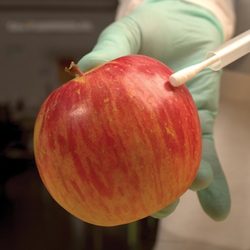During a 2011 listeria outbreak involving cantaloupe, 33 people died and 137 were sickened. While Anthony Zografos was not one of them, the story caught his eye. And the thing that concerned him the most was the weeks it took to pinpoint the source of contamination. Many consumers may have had those melons in their refrigerators the whole time, ticking time bombs that could make them deathly ill. Zografos, who has a Ph.D. in mechanical engineering and previously worked as chief operating officer of tech company Compact Particle Acceleration Corporation, wanted to solve this problem. There are two important reasons to make this information available, he said: food safety and guaranteeing authenticity. Most traceability applications on the market do a good job of keeping track of food packaging. Zografos wanted to create something unique. He founded SafeTraces, which creates DNA-level tracking that is applied directly to food products. While SafeTraces has been around for a few years, it’s recently announced high level partnerships with safety science giant UL to enhance palm oil traceability. This partnership gives businesses dealing with palm oil — a common food ingredient that has a reputation for being farmed using substandard sustainability and human rights practices — a potentially easy solution to guarantee the ingredient’s source. Last month, SafeTraces announced a partnership with JBT FoodTech, a leading producer of food processing and packaging equipment. While other methods to trace food focus on barcodes on food packaging, SafeTraces uses something much smaller: DNA.
READ MORE >

Categories:
Tags:
Comments are closed